The consultation on the Scottish Government’s proposed Learning Disability, Autism and Neurodiversity Bill has just closed, and I have mixed feelings.
The first thing to say is that this is a good thing, an important thing to be happening. By working on this Bill the Scottish Government are giving voice to the people who haven’t been seen, who have not been understood and so have been left out of service provision, denied the support and access that they need to live their lives. Without action, we risk continuing that exclusion from our broader efforts around human rights and equalities, access to health, social care and support, and housing rights.
Turning Point Scotland welcomes this Bill, the work that has been done and is being done to bring it into existence and the conversation it is encouraging. I see this Bill as a potential ‘expert contributor’ to wider policy initiatives, ensuring that this group of people are seen and heard and reflected in those efforts, but I have two main concerns about how this work is progressing.
Firstly, I’m concerned that we’re not reaching and engaging with all the voices that we need to. This consultation was an enormous undertaking – 189 pages, 14 specific themes covering social care, employment, social security and housing among many others, with a further 5 overarching themes.
This is alongside what I see as perhaps the most fundamental discussion on the reach of the Bill, on who should be included in its protections and the language and terminology we should be using. The impact and effectiveness of all the other elements depend on getting this discussion right, and I believe it is deserving of its own consultation.
I share the concern raised by the National Involvement Network in their response to the consultation.
“It is important to note that we feel a level of disappointment that due to the scale and complexity of the consultation, it was not possible to consult and hear from NIN members on every section of the Bill consultation. This now means that the people’s views and voices are potentially missing from multiple areas under consideration, for example the scope of the Bill and language used to describe the people it covers, and how accountability might best be exercised.”
Turning Point Scotland focused our response on the Complex Care and Coming Home and Reducing Restraint sections of the consultation; as a provider of services we felt these were the key areas where we could contribute. We recently hosted an event to showcase the work underway to deliver the Coming Home agenda, and today we are publishing our report on that event. We have promised that people stuck in hospital and inappropriate out of area placements will be able to come home, and the discussion at this event made clear the specific barriers standing in the way of delivering that promise.
We cannot achieve our aims without the right accommodation – we need to explore how we better integrated housing planning and provision into Health & Social care strategic planning structures, with the aim of developing measures within this Bill to support that integration
We cannot achieve our aims without the right support provision – we need to explore how this Bill could be used to address the crisis in social care recruitment and retention
We cannot achieve our aims without addressing the lack of understanding that exists in our social care and public sector services, and results in people with learning disabilities being labelled, dismissed and isolated as “challenging” – we need to explore how this Bill could be used to support the integration of Positive Behaviour Support across health and social care services, and consider its application to wider public services.
The measures proposed so far feel like a missed opportunity for action to address these barriers. I hope that this consultation exercise will highlight these gaps, and inform the Government’s next steps.
Read our report here:
Faye Keogh, Policy and Business Development Officer.
